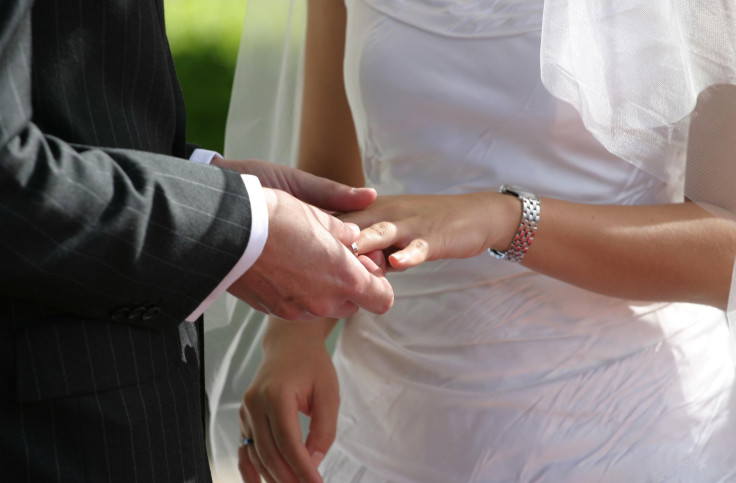Marital Problems: Why Women Feel More Comfortable Expressing Negative Emotions Than Men

Marital problems hurt wives and their husbands, but they may hurt women more, according to new research from Rutgers University.
Prior studies have shown older adults are less likely than their younger counterparts to express negative emotions, but more recently, this idea has changed. Some studies now suggest that 30 to 40 percent of older adults report feeling emotions, like sadness, worry, and frustration, on a daily basis, Sadness is an umbrella term for feelings of sorrow, despair, and hopelessness, while frustration is a less frequently studied emotional state — it may be particularly relevant to understanding the well-being of older married adults, researchers said.
To learn more, researchers studied the "actor and partner effects" in 722 older couples who had been married an average of 39 years; both spouses were at least age 50. These effects refer to the "extent to which one individual experiences or traits affect a significant other." For example, someone who feels supported may be more likely to provide that same level of support and encouragement for their partner, which protects them against negative emotions.
"Conversely," researchers explained, "if one partner is troubled by what they perceive to be low levels of emotional support from their spouse, he or she could act negatively toward them by criticizing or withdrawing affection, thus trigger worry, sadness, or frustration on the part of their spouse."
The couples considered in this study were originally participants of the DUST supplement and 2009 Panel Study of Income Dynamics (PSID), in which couples were interviewed annually between 1968 and 1997, and biennially thereafter. In addition to interviews and questionnaires, couples were assigned daily diaries, in which the diary kept track of all the activities the couples performed either solo or together, including paid work, house work, leisure, and self-care.
Then, using a range of zero to six, respondents reported their level of well-being during each of the activities — how much did they feel frustrated, sad, or worried? Marital quality was derived from this range, reflecting both marital strain and affective support. Feeling supported meant couples felt they could open up to their spouse, where as feeling strain meant couples argued more with their spouse (among other things).
The results showed that couples had very low levels of negative emotions and that gender difference emerge for sadness, but not for frustration or worry. Wives reported significantly high levels of sadness than husbands, while husbands rated their marriages more positively than wives — a finding consistent with prior research. Also, relative to wives, husbands reported significantly higher levels of support and lower levels of strain.
"When we consider positive and negative components of marital quality separately, we find stronger associations for marital strain than support," researchers said. "Own reports of marital strain are linked with higher levels of frustration for both husbands and wives. However, strain is linked with significantly high levels of sadness and worry for wives only; these gender differences are marginally significant, respectively."
Researchers added that these findings offer new insights into the complex associations between marital quality and discrete negative emotions in later life. With wives reporting greater frustration at the same time husbands report higher levels of strain, it may be that "married women are highly sensitive to and feel responsible for the emotional climate of one's marriage."
It could be, too, that more supportive husbands are frustrated by "the circumstances generating the need for support in the first place." Researchers speculated if husbands are more supportive, then they're regularly open to their spouse's negative and critical messages, in addition to losing out on time for "other social, emotional, and practical goals."
That said, researchers admit their study sample may be biased: Someone with more negative emotions may have offered more critical accounts of their marriage, and vice versa. Also, DUST did not measure for narcissism and agreeableness, two important contributors to marital quality.
Yet, despite these limitations, researchers feel their study reveals "the complex role that both own and spouse's marital appraisals play in the daily emotional lives of older adults." Lead study author Deborah Carr, a sociology professor at Rutgers, said in a press release that "this is particularly important as couples age, become more dependent, less healthy and face the possibility of getting dementia or becoming a caregiver," As an interesting aside, separate research shows male caregivers may be less likely to ask for help.
"If older men or women with dementia have reduced impulse control, they could lash out against their spouse if they're feeling frustrated," Carr added. "It's very important to keep in mind these dynamics even with long married couples who you may not think have any problems."
Source: Carr D, Cornman JC, Freedman VA. Marital Quality and Negative Experienced WellBeing: An Assessment of Actor and Partner Effects Among Older Married Persons. Journal of Gerontology: Social Sciences. 2015.
Published by Medicaldaily.com



























